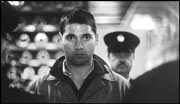CHOPPER
written and directed by Andrew Dominik with Eric Bana runs July 13-19 at Egyptian
IF NOTHING ELSE, Chopper makes American literary celebrities look like a bunch of sissies. Down Under, Mark “Chopper” Read is a best-selling author and career criminal with some two decades’ incarceration to his credit. He’s so tough that he coaches his own jailhouse assailant on proper stabbing technique; later, he calmly orders his ears chopped off to earn a trip to the infirmary—hence the nickname. When not writing volumes such as How to Shoot Friends and Influence People, Read claims to have killed some 19 individuals, which makes the guests on Oprah’s Book Club seem all the duller and more bloodless by comparison.
The blood in flows freely in Chopper, however, but with a transfixing gravity and seriousness. As we meet young Read in a Melbourne prison circa 1978, the lad deliberately baits, then suddenly knifes, a fellow inmate. Contrasted with the still, eerie, blue-white cell blocks, the thick, slippery goo that slowly oozes from the unfortunate inmate’s veins is less red than black. Throughout the first half of Chopper, former music video director Andrew Dominik uses color-blanched film processing to similarly drain the excess emotion of out material that otherwise might’ve been treated sensationally.
Yet Read protests, “I’m just a bloody normal bloke,” in one of his endless asides (presumably taken from his writings). That matter-of-factness may disguise a “bloody schizo” or even manic-depressive personality, since he’s the sort of guy who can feel tenderness and remorse just after stabbing someone. As a young man, Read appears less vicious than principled. “You gotta keep moving forward, otherwise you bloody perish,” he declares, sounding almost Nietzschean in his determination. It’s a calculated stance, a credo that’s the product of a mind constantly regarding itself. Read’s creating his own myth, abetted by the nervy genius to add fictional carnage to factual mayhem. It doesn’t matter how many murders he subsequently confesses to the cops, he realizes; it’s the telling that counts.
THE TELLER becomes even more convincing, and scary, in Chopper‘s second half, as Read is released in ’86. Shot in sequence, the movie here transforms its hero ࠬa De Niro in Raging Bull; slim, almost boyish former comic Eric Bana becomes a bloated, meaty, tattoo-covered goon with a menacing handlebar mustache. The older Read is an even more volatile, frightening SOB; in this regard Chopper recalls another uncompromisingly violent Australian crime flick, 1992’s Romper Stomper, which also featured a controversial, career-making performance by its star, Russell Crowe. (Bana’s likewise moving up to the big leagues of Hollywood filmmaking, appearing in Black Hawk Down this fall.)
Numbed with booze and drugs, professing to have police sanction for vigilante justice (actually a paranoid vendetta), Read inhabits a garishly colored world outside prison. Dominik frequently lights his sets with one dominant hue framed in the background, while in the dingy foreground everything looks dirty and debased. Skin tones appear pasty. No wonder, then, that Read constantly embellishes his pseudo-confessions to disbelieving cops; he’s being overshadowed by the harsh glare of his own infamy. Chopper intersperses Read’s story with these Q&A sessions and a notorious drunken national TV interview—which he later critiques with good-natured laughter and lucidity in the company of his jailers.
Here again, Read’s ruefulness suggests Raging Bull, since Chopper is a similarly punishing, intense character study for movie lovers with strong stomachs. (It’s also got its share of unexpected black humor.) Past his criminal prime, Read still clings to his myth, knowing that his reputation can be better perpetuated in ink than blood. “I’m an expert at playing mind games,” he says, but his mind may be playing games with him. Peddling stories to the press, the scarred old ex-con eventually becomes his own best reader, believing the lies and forgetting the bloody truth.








